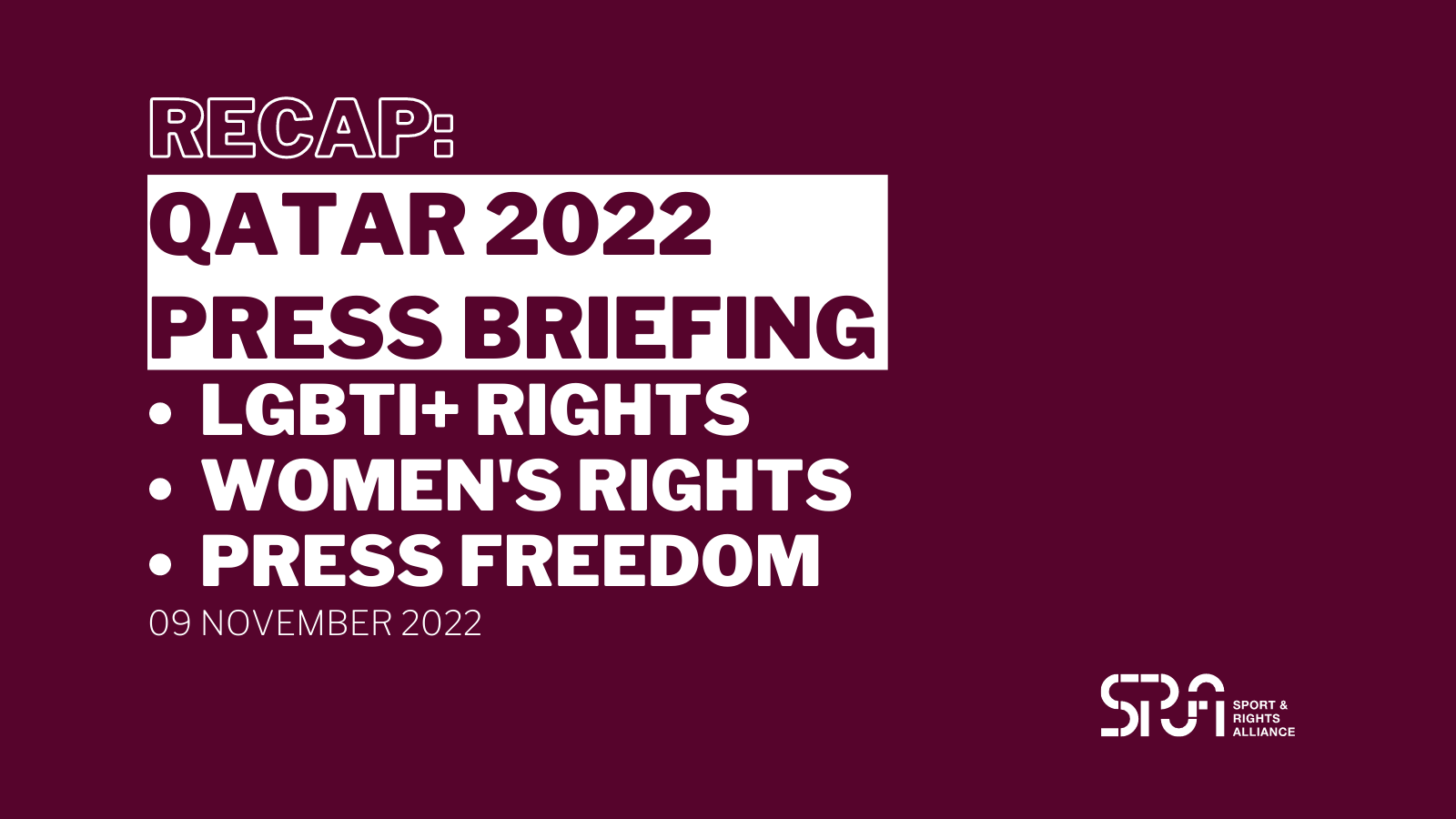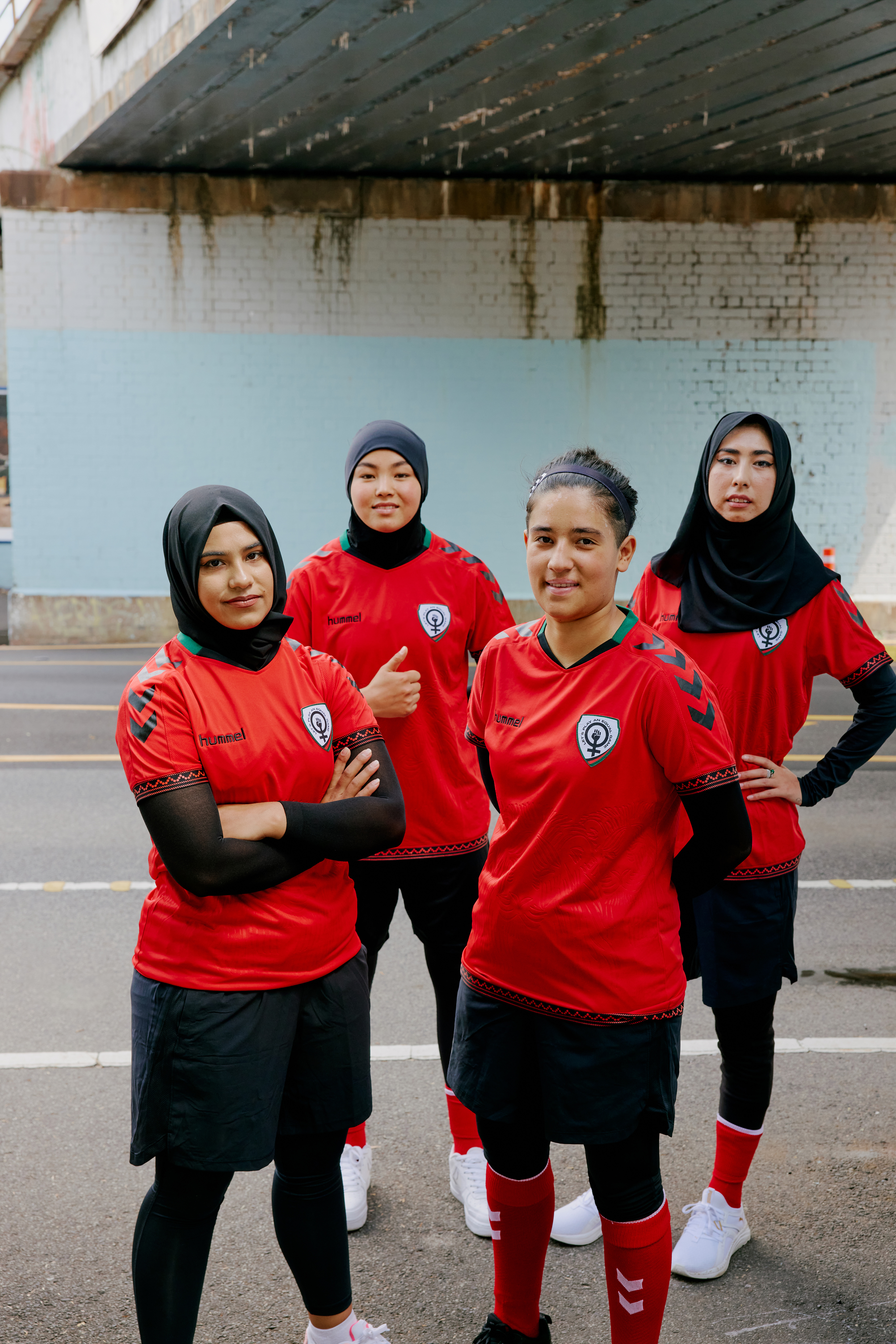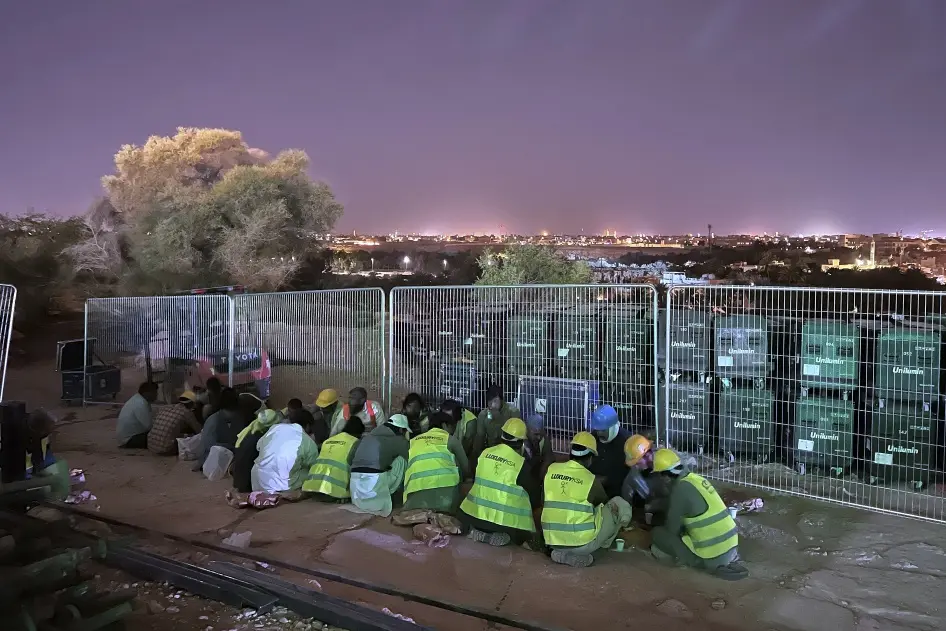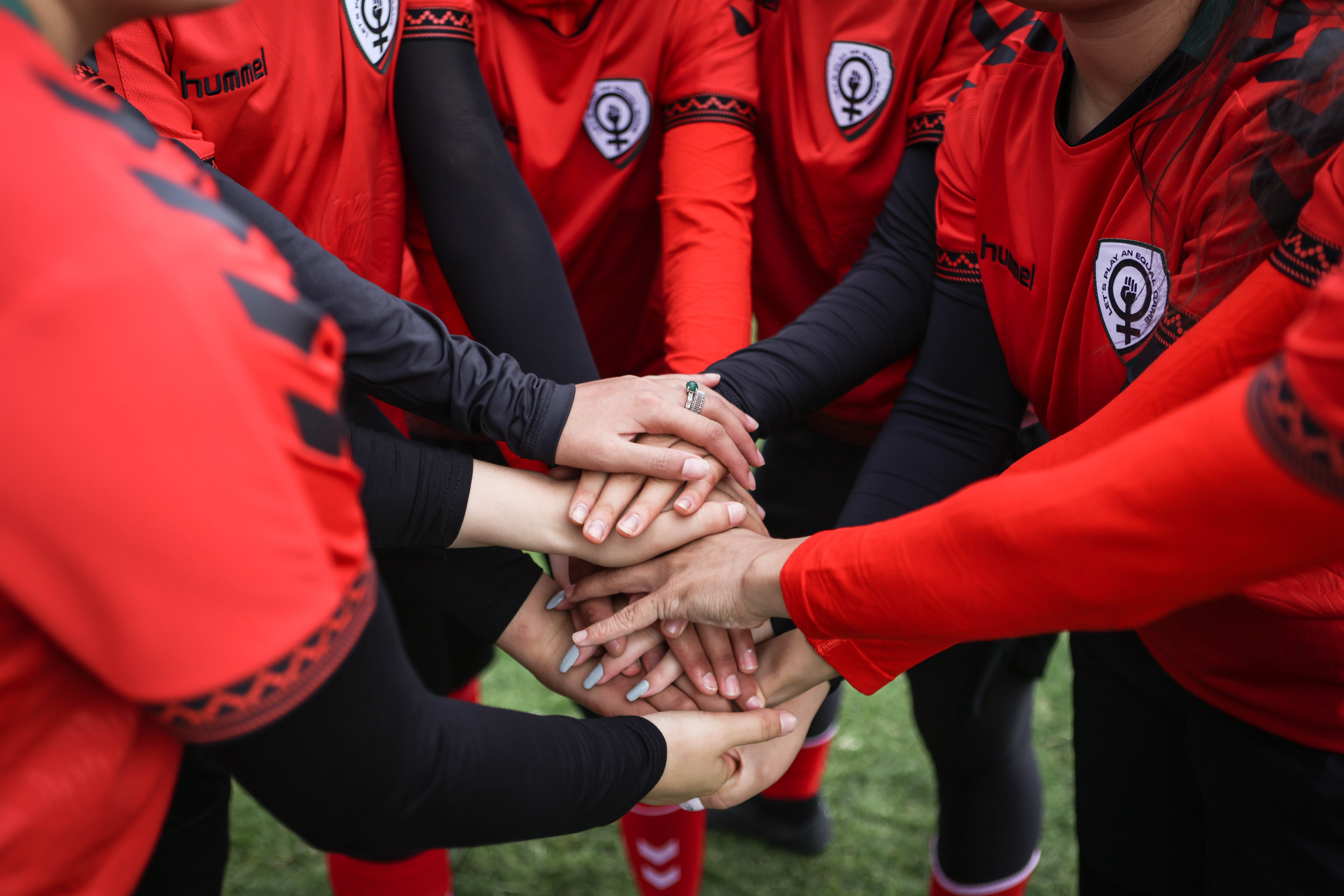Since FIFA awarded the 2022 Men’s World Cup to Qatar in 2010, the exploitation of migrant workers fueling the 220-billion-dollar infrastructure project became the center of human rights concerns about this mega sporting event – but it was by no means the only human rights issue at play. On the 9th of November 2022, eleven days before the first match of the tournament, the Sport and Rights Alliance brought together experts to brief reporters on the broader landscape of human rights abuses in Qatar.
Featuring personal testimonies from out gay former professional footballer Thomas Beattie, NRK journalist Halvor Ekeland, and head of LGBT+ football supporters group Three Lions Pride Di Cunningham, the conference resulted in over 100 attendees and coverage in several international media outlets including The Guardian, The Independent, Newsweek, Inside the Games and EuroSport.
The Sport and Rights Alliance amplifies the voices of everyone vulnerable to sport’s negative impacts – from players, workers, fans, and journalists, to children, women & people with diverse sexual orientations, gender identities and sex characteristics. Andrea Florence, director of the Sport and Rights Alliance, opened the webinar highlighting the intersectionality of human rights, stating, “Abuses against migrant workers do not exist in a silo: Restrictions on LGBTI+ rights affect women’s rights, restrictions on women’s rights affect labor rights, and restrictions on press freedom affect people’s rights to be informed and speak out.”
At the conference, Three Lions Pride, the LGBT+ fan group of the English national team, co-Founder Di Cunningham announced the group would not travel to the World Cup, despite assurances from FIFA president Gianni Infantino that “everyone is welcome” at the games. Cunningham added that fans were “hearing what seems to be a kind of robotic insistence that all will be well, that we’ll be safe, that we will be welcomed, but it’s not backed by evidence or documented plans. There’s no sign, as there was in Russia, of any kind of appetite to relax or review the toxic environment there is for LGBTQ+ and other minority groups.” Past rhetoric from top FIFA officials also does not support the welcoming environment peddled. Former president of FIFA Sepp Blatter initially stated in 2010 that “people should just be less gay,” and Qatar World Cup Ambassador Khalid Salman described being gay as “damage in the mind.”
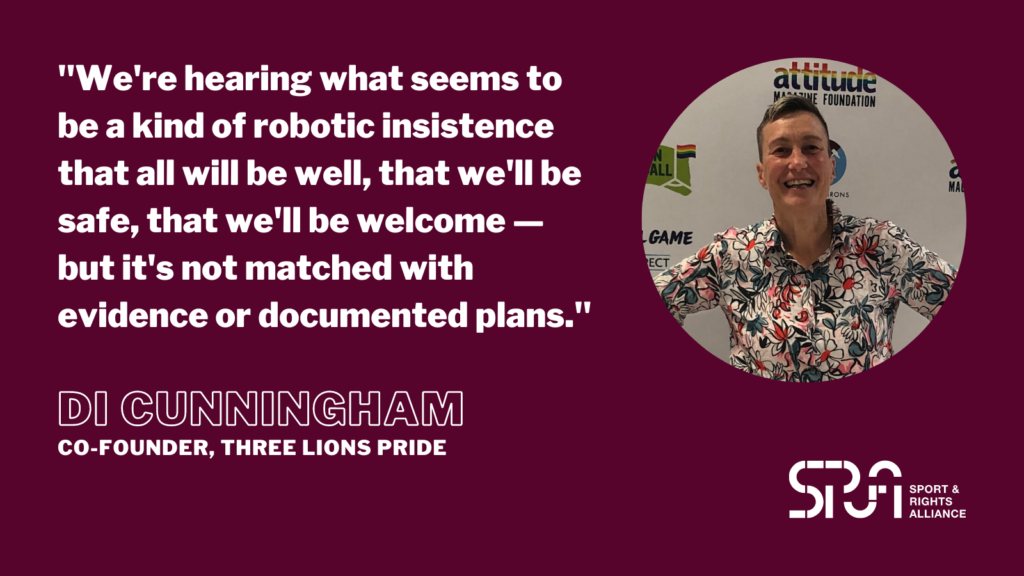
Thomas Beattie, a former professional football player and an advocate for LGBTI+ rights, responded to these remarks and their discordance with the values of sport. Beattie said that “it sets the tone for what these principles and beliefs are from some of the people that are in these establishments. The reality of it is, is that sport is a vehicle for change, but it only is a vehicle for change if we actually follow through on some of the values we know sport embodies which is that sport is for all.”
Chamindra Weerawardhana, senior consultant on gender identity, expression and sex characteristics at ILGA World, illustrated a bleak picture of the situation for LGBTI+ people living in Qatar. Same-sex sexual activity is criminalized under Article 285 and 296 of the Qatari Penal Code and punishable by death according to Sharia Law. “People of diverse sexual orientations and gender identities cannot live their lives openly in Qatar. Our communities are forced in the shadows. It’s a deeply problematic situation”, said Weerawardhana.
Women also face discriminatory rules in Qatar. Rothna Begum, senior women’s rights researcher at Human Rights Watch described how male guardianship laws require women “to obtain permission from their male guardians … to marry, to study on government scholarships, work in many government jobs, travel abroad until certain ages, and receive some forms of reproductive healthcare,” among other limitations.
Lead researcher on the situation of migrant workers in Qatar for Amnesty International, May Romanos found women domestic workers, isolated in their employer’s homes and trapped within the Kafala system, were especially vulnerable:“Out of the 105 women we interviewed, 35 said they were a victim of verbal abuse, 15 were said they were victims of physical abuse, and 5 of sexual abuse. Ultimately, none of these women saw their perpetrators held to account.” Romanos further described the obstacles these women faced seeking justice and care, including a lack of functioning women’s shelters, possible retaliation from employers, and conviction for violating “Zina laws,” which prohibit sex outside of marriage.
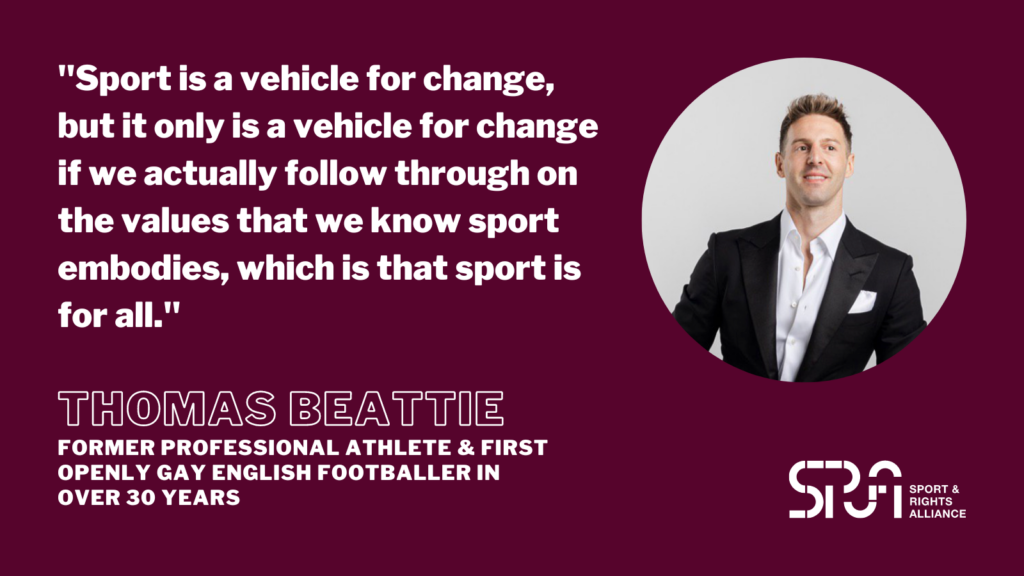
On the topic of press freedom, Justin Shilad, senior researcher at the Committee to Protect Journalists described the “pervasive censorship climate” in Qatar, and its impact on human rights more broadly. Shilad highlighted that “this raises broad concerns not just for journalists and their sources but also those concerned about women’s rights, LGBTI+ rights, and migrant rights … despite assurances that LGBTI+ fans will be safely able to attend the cup, Qatari authorities have censored media coverage of this community and their concerns.”
Qatar has passed laws increasing censorship since the country became the World Cup host – a “cybercrime prevention” law in 2014 and a “false news” law in 2020 – and has detained journalists for documenting migrant labor rights issues. Halvor Ekeland, a Norwegian journalist detained for 32 hours in 2021 for investigating migrant worker conditions also spoke and shared his experience. Ekeland explained that without the critical information he requested on his standing and guarantees of safety from the Qatari government and FIFA’s Supreme Committee, he was not be able to return to Qatar to continue his job reporting on the 2022 FIFA Men’s World Cup.“FIFA has given us some promises, but they promised press freedom a year ago as well. We all see how that ended up”, added Ekeland.
After the briefing, Human Rights Watch published its “Human Rights Guide for Reporters” outlining its concerns for the World Cup against the backdrop of FIFA’s lack of assurances and protections. Echoing the sentiments of several speakers at the briefing, director of global initiatives at Human Rights Watch, Minky Worden, called on FIFA to implement and execute a strong human rights framework.“We can never again have a World Cup that fails to respect basic human rights and that, days before, simply has none of the expected assurances and protections”, said Worden.
